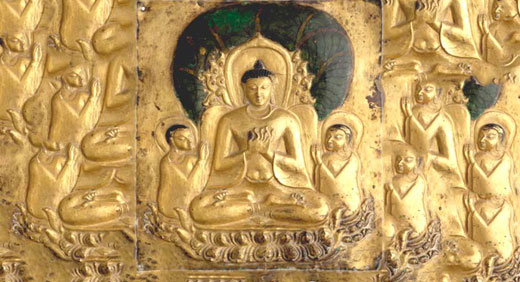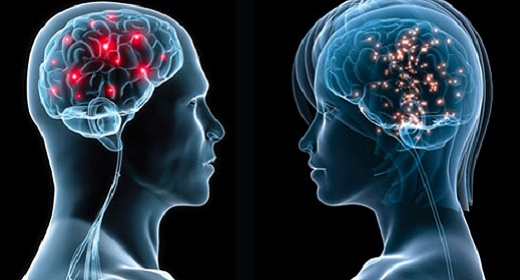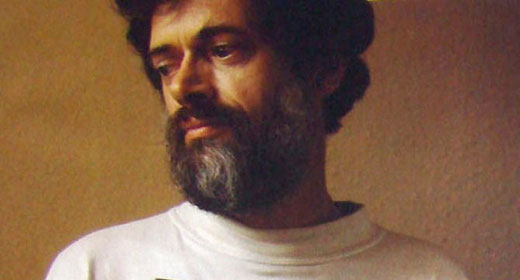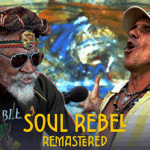Donna Quesada: We are talking about Buddhism and the state of the world and making these valuable ancient teachings relevant…

and I know you must get this a lot, when people say “How does a monk meditating, help the world?” There is always this tension between fixing yourself, which Buddha emphasized, and the relationship that we should have with the world. And I think that is a hard one for the western mind to grasp because we are so outward focused…you don’t think so?
Robert Thurman PhD:: I don’t think so…no…because for example, mindfulness practice today is so wide-spread…in America, in corporations and everything. Although, it’s not the full Buddhist mindfulness practice. But it’s some element of it. And that helps people control negative emotions. And reactivity. And the Buddhist contribution to politics is no killing and dialogue. And its sort of like a Buddhist incite that anyone can understand. For example, nobody wants a nuclear war today. So therefore, anybody who threatens that…that’s not acceptable to threaten that. And if somebody uses them, that is just another reason you can’t use yours. You can’t use yours anyway and nobody has uses for them, except the one time. And basically, nobody can because there is no winner in that kind of exchange. So therefore, we are in a different situation since 1945.
West…east…self-restraint, has to enter the picture at some point. Therefore, the skill of developing such self-restraint…in the Buddhist analysis, the key component of a nuclear weapon is the human emotion of hatred. That is the chemical trigger. Not some plutonism. It’s human hatred. And so, the Buddhist service of self-restraint…at a certain level…when hatred takes you over and you just blindly charge ahead, whether it’s self-destructive or not. The skill of how to do that is necessary for anyone. Whether you are American, or any kind of person. So, we have to exercise that. And we can’t play these kind of bluff games of we’re going to blast you. If somebody does do that, you can say “well, that’s ok, you don’t have to do that.” We can talk. Even if we have to talk to someone who acts like that…they can’t just sit and mutually scream at each other because neither one can really pull that trigger. In fact, it’s impossible for them because they are not going to win. They know it. So that’s the skill…the contribution.
The Dalai Lama says, “world peace through inner peace.” And that means that people have to acknowledge these sorts of conflicts that arise. There is an element of human choice in those conflicts. And that is the key element that triggers them. Sooner or later, for example, Black Lives Matter. This thing in America…that with impunity the police can shoot some black guy in the back and they are pretty confident they are going to get off being rarely punished for that. Even though there will be a riot in town. And that will give more violence an excuse. However, that is not viable continuing like that. So instead of giving police left-over armored vehicles from the Vietnam fiasco…that was completely criminal and shouldn’t have been engaged in. Nobody wants to really face that but it was. Instead of that, police will be trained in police academies in mindfulness…in how to not let racial prejudice trigger a racial thing. Sometimes running away from them and no longer (being) a threat to them. And there will be cameras on them and eventually this impunity will no longer be there. It’s impractical…it’s impossible.
America is too individualistic and we are too freedom oriented to become a police state. It’s impossible for us to go back to that. The people who are living in denial of what is going on…they have to face that. They can’t stay in denial about it. So that’s world peace through inner peace. Most people who are police are kind people…they like their grandmothers, they like their grandchildren. And they know that black people are human beings. They are not some kind of sub-species. They know that, really. They enjoy watching football games, they like comedians. And so subliminally, they can’t be convinced that they are dealing with some kind of rodent to be exterminated. Anyone who tries to do that, KKK kind of people…are just barking up the wrong tree for the modern period. But on the other hand, we are not educated to control this reactivity. Especially men. They are not educated like this. They still have emotions…not just Buddhism…Christianity, Judaism and even humanism…tells them not to have lethal reactivity as an acceptable part of their psyche. So, they need help on how to do that. And the Buddhist service and the Hindus…and mystical Christians, like Thomas Merton…and also, Kabbalah type of Jewish people…they have the skills to help them and it’s just a matter of putting it in the curriculum. And that will happen eventually. Actually soon. Because this stand off situation…like Ferguson, wherever it happens, Chicago…it’s not viable.
DONNA: And this word that you mentioned, mindfulness, has become such a buzz word lately.
BOB: Yes. Is that good?
DONNA: It is good. Now, do you think of it as the art of being present? And if so, how does the act of being present help reactivity? You see this kind of counter point to that in the west. And I’ve seen this on TV shows where people have problems with negative emotions. I know you wrote a book on anger and the approaches to vent it. It’s all about venting. And that became very interesting to me because coming from a Buddhist background…you know, I remember what Thich Nhat Hahn said, “you are just rehearsing the anger.” And yet, it continues to be a psychological approach. Do you think there is ever a place for that and if so, when does mindfulness become the better approach? If ever…
BOB: Mindfulness, by itself, will not necessarily help control unrestrained fury. But the Buddhist input just within psychological studies…there is a lot of proof about people when they become enraged. Their judgement about the situation they are in is reduced by about 85%. And they become self-destructive even. And it’s an ineffective response even to a stressful situation. And there are tons of studies like that. It’s also very bad for the circulatory system. The release of cortisone…the pumping of the adrenal gland…it’s completely unhelpful to the health of the person. The heart…there are a lot of studies of that kind. So, the venting thing is kind of a lost ground in psychological science. And psychological science is no longer doing that and there is book, like a wonderful book called Anger: The misunderstood emotion. I forgot the name of the female author of that but it’s a wonderful book. But that is the correct title and I’m sure it’s on Amazon. And it shows what she calls the Hydraulic Theory of Anger. That it builds up and you have to vent is absolutely not correct. It’s a mistaken notion. And people can restrain and control their anger when they feel they have to.
And Mindfulness…if you take it a little further and deeper and what you do is just not be present in the moment, but you become present to how the mechanisms of your mind are causing you to react to situations. And when you do that, you can then learn to intervene, in a sort of…a process of the mind that normally, in highly reactive people are completely unaware of…and they just feel an impulse to charge ahead like a bull. And they go straight ahead. But after banging their head against the wall for a number of times, they then figure out how to restrain themselves. And even Thomas Jefferson said that if you find a situation that is really bothering you, count to 10. Take 10 breaths. And he said, “if it’s really bothering you, take a 100.”
DONNA: It’s a kind of mindfulness
BOB: Hundreds of years before Buddhism, in the west. The protestants would call it conscientiousness. Because Protestantism got separated from the mind training and skills of Christian monks…who did have this knowledge, also. They don’t use it. They act as if there is nothing you can do about yourself…just hope Jesus will help you later, after you made a mess, basically. It’s about having faith. Nowadays, people are realizing that they have to be responsible for themselves. There is one thing to be said in America though, at this moment, that I think is very important. And that is women. Women are socialized actually, not to react forcefully to a negative situation. They sort of swallow it. And this makes them feel ill and become abused.
And so, then they feel like they should be righteously angry about the Harvey Weinstein’s of this world, or whatever it is…the idiot that is saying this or that to me. And in a way, they should be more forceful. And in the Buddhist theories and psychologies about anger, one of the key things about it is that you become really angry when something is happening that you think should be prevented, but you feel unable to do so. Or, something you think should happen is being blocked and you feel unable to remove the block. And so, then you feel kind of weak and you start feeling really frustrated. And really defensive. You lose your good mood and then anger whispers to you in your own voice…oh, if you blow up, you will be stronger. It’s like the pusher coming up and saying, “if you shoot up, you will be fine.” And you feel good venting, at first. But in fact, what you do when you do blow up is very unskillful. You over-react. You bring more oppression down on yourself…‘cause the other one then comes back at you.
So, one of the Buddhist things is that a creative energy should be released very actively before you get frustrated and then angry. In other words, go in to interfere with the situation. Interrupt the moron who is blabbing some idiot thing. Push back at the guy you know is going to do some inappropriate advances at you and remove yourself from the situation. Or say, straight out, “no,” in a humorous way, if you have good humor and skill to do it. That is very, very key. Women, in particular, in our culture…men, as socialized to be quite aggressive. But women are not. And so, they tend to build up frustration. And then only flip out when they can no longer be effective. Or don’t flip out and they get sick. Or become abused.
DONNA: So, the intervening method is almost pre-emptive in that case?… Which does require an intense, mindful awareness.
BOB: Exactly. It does. Trusting their own intuition. It’s a blind date. They meet the guy…oh no, this is a guy that is going to do something inappropriate. This guy is really out of it. Knowing that right away. Then something bad happens. So instead, ok thanks a lot, I’m going to go home now, in a happy way…so sorry… see you another time…whatever it takes. Like, moms are really skillful when the brat is having a tantrum. They stay happy and they don’t think that kid is a brat, but they know he’s going to be a brat when he has a tantrum. They intervene in a humorous way. They distract him…oh, here is Big Bird…whatever. People are incredibly skillful when they are really happy…before they are frustrated. Women must be encouraged not to think…some religious person, or Lama, or Rabbi, or minister is saying “Listen dear, don’t lose your temper. Swallow it. Guys are going to be idiots. Don’t get mad.” No. You go out and protest right away. But in a humorous manner.
DONNA: I love that.
BOB: Not in a hateful way, where you have lost control of yourself. In which case, you are going to give fodder to the opposition. This is very key when we talk about reactivity. Women must be encouraged to be pro-active. Not reactive but pro-active. More pro-active.
DONNA: You know I love several things about this….the creative aspect. We all know people who are naturally like this. That defuses a tense situation with humor in such an artful and creative way. And it can make spiritual practice…which can seem very strict…very light and very applicable…very day to day. Fun.
BOB: Happiness and fun are key. We need a revolution, as Bernie Sanders said. But we don’t need an angry one. His whole problem is the way he says the word rich. He says “tax cuts for the rich.” He should say, “they don’t need the money and they don’t sleep soundly because they might lose a billion dollars if they don’t check the market.” It’s hard to have a lot of money. They don’t really need more. They feel insecure. They feel isolated. We love the rich. It’s great. But when it gets excessive, it’s a burden. So, we have to love the bad guys. It sometimes means, oppose what they are doing because it doesn’t make them happy. But, we don’t hate them. And we can’t say we can be justifiably bad and have a violent reaction. They tried that a hundred years ago in Russia. Nice people. Russians are really nice people. But if someone gets new power with violence, then they are just the new violent oppressors. They may even be worse than the old ones because they use the violence to gain power. So, we don’t want that. We want world peace through inner peace. And that’s why Dalai Lama is so great. He wants to talk to the Communist leaders of China. He wants to be their friend. How can they say he is a bad guy when they have never met him?
DONNA: Love your enemy.
BOB: Loving your enemy is really practical advice. Jesus was really on to something.
DONNA: He was.
BOB: Your enemy is only your enemy because he thinks you are standing in the way of his happiness. So, he has to push you around to get you out of the way, so he can have what he thinks is going to be his happiness. But then, it actually doesn’t make him happy to push you out of the way. And then pushes some other people out of the way. So, if he was happy, he wouldn’t bother to be your enemy. He would be having fun. He would be going out and having a party, and maybe want you to join. He is an enemy because he is unhappy. So, love your enemy is very practical. People say “I love Jesus…he’s so sweet.” But, he didn’t say “bomb your enemy,” he said, “love your enemy.
Read and Watch Part III Here: Awaken Interviews Robert Thurman PhD Pt 3 – Be Lucid Waking
Read and Watch Part I Here: Awaken Interviews Robert Thurman Pt 1 – His Spiritual Quest









































